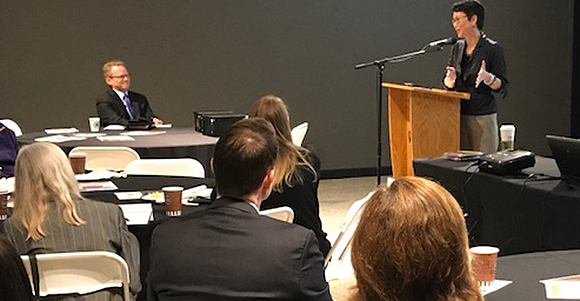
California Community Colleges Executive Vice Chancellor Van Ton-Quinlivan speaking at th Orange County Future of Work MeetUp (Photo: Ed Coghlan/CAFwd)
Originally published on OCDE Newsroom
Artificial intelligence. A new wave of automation. The rise of the gig economy.
These are some of the challenges facing today’s workers, employers and educators. And they were among the topics discussed Monday during a presentation on the “Future of Work” hosted by the Orange County Department of Education, OC Pathways and the Orange County Business Council.
California Community Colleges Executive Vice Chancellor of Workforce and Digital Futures Van Ton-Quinlivan was the featured speaker at the morning session, which was held at Urban Workshop in Costa Mesa. It marked the latest in a series of 2018 Future of Work MeetUps taking place across the state.
These presentations, organized through partnerships that include California Community Colleges, California Forward and California Economic Summit, have been designed to help policymakers, employers and workers ensure California’s economic resilience.
Along with Ton-Quinlivan, Monday’s speakers included Orange County Business Council Chief Economic Advisor Dr. Wallace Walrod, OCDE Chief Academic Officer Dr. Jeff Hittenberger and OC Pathways Executive Director Amy Kaufman. They addressed an audience of about 60 business leaders and educators from the K-12 and community college systems.
As the speakers noted, an increasing percentage of occupations now require a college degree, and about 47 percent of U.S. jobs could be performed by robots and other automated technologies within the next two decades.
Ton-Quinlivan said current economic forces have become particularly difficult for stranded workers, a term used to describe working adults who have been left behind by technology and can’t access traditional college programs. She used part of her presentation to talk about Governor Jerry Brown’s recent proposal to establish an online community college capable of providing adult learners with new skills, as well as the requisite credentials needed to keep pace with today’s economy.
“Let’s talk about the stranded working adults,” she said. “There are 2.5 million adults who are in this economically vulnerable situation in the prime working ages of 25 to 34. So 2.5 million adults have a high school degree with no industry-valued credential. If you extrapolate that age all the way up to 65, you add another 6.2 million adults, so over 8 million adults are in this situation.”
Flexible and affordable educational options are needed to help these stranded workers get on track, Ton-Quinlivan said.
Earlier in the session, Wallace Walrod of the Orange County Business Council said a number of jobs are increasingly vulnerable to automation. Yet other occupations are less likely to give ground to the encroachment of disruptive technologies, and recent research has identified some of their common characteristics — or what Walrod called “dimensions of defensibility.”
These include careers in which employees must coordinate with others, teach others, strategize, plan and generate ideas.
“So some of the strongest predictors of defensibility are very human characteristics, such as coordinating with other people and thinking creatively,” he said, “and these turn out to be the most defensible across all types of skill, knowledge, abilities and work activities. These human strengths are reflected in our research findings.”
OCDE, OC Pathways and the Orange County Business Council will resume this conversation on Tuesday, May 1, as the three agencies will team up for a follow-up presentation titled “The Defensibility of Education and Jobs in an Automated Society.”
Walrod and Hittenberger will again be featured speakers at the event, which will be held at OCDE’s main campus in Costa Mesa. Objectives include helping educators prepare students for jobs in an automated future, promoting the principles of human-centered design thinking, and understanding the role education plays in cultivating creative intelligence and social intelligence.
For more information on “The Defensibility of Education and Jobs in an Automated Society,” or to register, visit link.ocde.us/AutomatedJobs.

